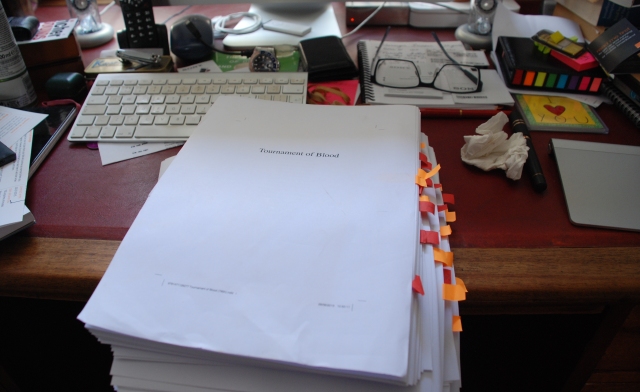Editors and Editing

Yesterday I had to give a talk to the Society of Editors and Proofreaders – and I had great fun!
It is a constant source of astonishment to me, how many people say that they hate editors and all their kind. One friend of mine routinely tells how his was trained by the Gestapo, while another lambasts them for being frustrated authors, and “if they want to write a bloody book, they should go and write their own …”
But, and I think it’s a big “but”, they are essential – as many people, those who read and especially those who read ebooks, are beginning to realise.
Yes, it’s not nice to get an editor’s comment on a book. You know the one: on the line underneath “I really loved this one” there’s the little “Just one or two suggestions” sentence. Which usually leads into a minor 30 page dissertation pulling the book to shreds and trying to impose some order on your story and characters.
The thing is, no matter how objective, sensible, literate and methodical an author may be, he or she will invariably muck things up as soon as he or she starts to read – oh, I can’t be bothered to keep up the he/she malarky – his work. The thing is, as soon as the author’s eyes light on a string of letters, he sees what he expects. In his head the recording is playing, telling him how this scene goes, with every word picked carefully for maximum effect, every comma and full stop perfectly positioned. Apostrophes? No problem for our intrepid scribbler. Semi-colons? Fine.
But on paper, they sneakily move around.
There have been studies conducted by reputable American universities, which have found that when a person sits and reads from a screen, much of the information is missed. For proofreading, it’s a disaster, apparently. The brain can cope far better with words printed on a sheet of paper. But even then, people make a mess of things. If you read words on a sheet of paper, and you wrote those words, you find that you miss typos and misspellings. You may have read that piece of work twenty or thirty times, but if you only sit back and read it, you will miss a load of the errors.
The only way, as demonstrated by personal experience, is to read the words aloud. That means you get the eyes, brain and mouth involved. It sounds daft, I know, but it does mean that while checking your work, if a comma is missing, if a word is mistyped, you will notice it. It makes you stutter, and when you look for the cause of the stutter, you will find the typo.
On the door of my office at Exeter University, there is a page of typing that was sent to me a while ago. It has a number of words on it, but in each word every letter other than the first and last have been randomly rearranged. What is fascinating about it is that you can read it perfectly easily. It is a proof of the fact that the brain (clever device that) can pick up the words on the fly. All the letters in the middle of the word are checked instantly. So long as the first and last are in the right place, the brain can quickly rejig things and make sense of it.
All of which means that authors will miss most of their own errors.
And that is why editors and copyeditors are so vital. How often have you picked a book and read it on Kindle, only to “tut, tut” and mutter indignantly at the complete lack of decent spelling and grammar, or the simple typos that really should have been edited out?
Well, in part this is a function of the constant driving down of prices in the book industry. Publishers employ fewer and fewer editors and other staff, but they don’t do without. However, many books that go straight to ebook are written by people with no experience of publishing, no understanding of editing, and only a fervent belief in their ability to become the next JK Rowling or EL James. And some are making a good living at it, don’t get me wrong. But the vast, vast majority are throwing their work at the internet in the hope that they’ll make their fortune – and don’t. It’s hardly surprising. Even when they are given away for free, bad work will not entice happy comments from disgruntled readers who reckon they’ve wasted their time.
However, for me, the experience of reading is wrecked by poor editing. I still remember the disgust of reading a published book set in Georgian England that had been bought from an American writer, which spoke of the cicadas chirping in Kent. No. We’ve never had cicadas in the UK. There was mention that it was a cool evening, so they put hickory wood on the fire. Again, no. We don’t have hickory now and didn’t then.
That book was published in the US, and then the series brought to the UK. Clearly no one bothered to edit or copyedit, and as a result when I wrote a review, I was extremely rude about it. Perhaps I should not have been, but I was. It was a bad book, to my thinking. It was let down badly by poor research and non-existent editing.
So, two rules about good writing here:
First, always, always, read your work aloud for typos and errors;
Second, if you’re going to try to look serious about your writing, no matter whether you go the traditional publishing route or decide to self-publish, always pay someone to edit it professionally.
It costs money, but it is money very well spent. And it may just lead to sales.





I think it’s having pride in your own work to have it edited and researching the country you’re writing about is just common sense. You’d think!
LikeLike
And yet so many get angry or defensive. Personally I have always thought editors are collaborators, not the enemy!
LikeLike
It’s the difference between a good book and a book that hasn’t been through an editor. Readers can tell! Readers are intelligent individuals.
LikeLike
Very true! Thanks for the comment
LikeLike
Copy-editor’s Joke.
Q. How many authors does it take to change a light bulb?
A. Authors never change a damn thing.
Trouble is, Mike, the copy-editor who does try to rewrite the book. I had one, name of ***e* ****, who did just that. As you described he/she ‘loved the book’, then sent 30 pages of notes that were mostly her/his opinion, and mostly nonsense. But the real sin was he/she made other significant alterations that were never mentioned in the notes, and often changed the sense of what my characters were saying, in direct speech. Result, I had to go through every page of the copy-edited ms, repairing the damage. Used to drive me crazy, and eventually I yelled, ‘Enough! Get rid of this person!’
As I did, I also asked the key question. ‘Is M* **** paid a flat rate for the job, or by the hour, as billed?’ I don’t have to tell you what the answer was.
Now I have a lovely copy-editor, name of J*ne Heller, who’s constructive, helpful, knows her brief, and never leaves any dead chauffeurs behind.
LikeLike
Thanks for that, Quintin. Still remember SF with pleasure! Thinking of another signing trip, Rambo is coming to visit next week!
LikeLike
For me, experienced beta readers do the same job Michael. Instead of just one set of eyes (your copy editor), I have four sets of eagle eyed writers looking for errors or all kinds. Believe me when I tell you that I can’t get away with anything. I also act as a beta reader for them as well, which is when I get my own back LOL ;)
LikeLike
Well said. I was advised by two published authors to seek a professional editor. I was fortunate that one of the aforementioned authors recommended a previous editor of theirs to me. I received a 6-page report and an annotated mss with margins rammed full of comments (not all of them welcome at first). However, I knew if I wanted my work to be taken seriously I would have to knuckle down and rewrite my novel. Since then I have edited on pc and paper, read aloud, sent it to Beta readers and spent 3 months sculpting the most difficult scenes with a mentor. I hope to submit next spring and can’t wait to begin redrafting my second novel, so that an editor can help me shape it into a good book. Honour the editor. They are the gold leaf on your manuscript.
LikeLike
Thanks for that!
LikeLike
I recently bought and read a book because the author enterprisingly urged me (on Goodreads) to do so, giving the reason that we like some of the same writers so I might like his book. I expected to find it unreadable, but did not, and it was interesting. It appeared to lack editing. I sent a private message to the author, not making criticisms but asking some questions, mainly about period dialogue. Part of his response was this:
“you have brought to my attention a number of issues, the majority of which – apart from the typos – haven’t been issues, they’ve been instances of you not reading the text properly.”
Excellent, no?
LikeLike
An interesting response!
LikeLike